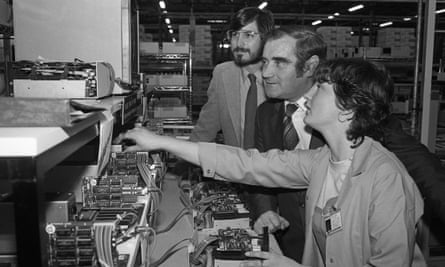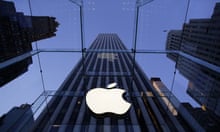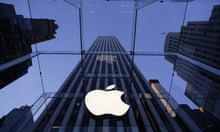One of the islands that makes up Papua New Guinea is called New Ireland. But it seems that a much colder island far to the north might also wish to be called New Ireland – the island formerly known as Great Britain.
In the wake of the European commission’s ruling that Ireland must reclaim €13bn plus interest in taxes from Apple, there is a good deal of excitement at the prospect of a post-Brexit Britain replacing its smaller neighbour in the affections of tax-shy global corporations. As the Daily Telegraph put it in an editorial: “If Ireland and the EU do not want a huge, wealth-creating firm doing business in their territory, Apple will be very welcome in the UK.” Welcome, that is, to use the UK as it has previously used Ireland – as a compliant state that will look the other way while vast profits pass through, untaxed.
It is, on the surface, an appealing prospect. You only have to walk around Dublin or Cork to see that Ireland’s tax regime has been a honeypot for all the hottest digital corporations – not just the long-established ones like Apple, Microsoft and Intel but the entire new wave of internet behemoths: Google, Facebook, Twitter and so on. And the same is broadly true in other areas such as pharmaceuticals and medical devices. Little Ireland has a stock of US direct investment much larger than France and Germany combined. Ireland is the number one location worldwide for investment by US chemical and pharmaceutical companies and number two for IT companies. And no one thinks those corporations are attracted by the scenery.
For the more excitable elements among the Brexiters, the EU’s ruling on Apple’s tax bill thus opens up a delirious prospect. The Brussels bureaucrats are moving against Ireland’s vigorously pro-business taxation policies, but Britain, when it throws off the shackles of the EU, will be free to swoop in and grab the golden eggs from the Irish nest. Apple and Pfizer, Facebook and Google, driven by EU persecution from the emerald isle, will seek asylum in the New Ireland next door, where the writ of the Eurocrats does not run and the government knows how to treat a corporation with the respect it deserves. Could there be any more dramatic illustration of both the evils of the EU and the thrilling possibilities of Brexit?
There are, however, two small questions about this strategy. Is it possible? And is it desirable? The answers might perhaps curb the enthusiasm of the true believers.
There is, for a start, the small matter of whether, even after the EU tax ruling, Apple wants to leave Ireland for the UK or anywhere else. The answer could hardly be clearer – it doesn’t.
In an interview with Ireland’s national broadcaster RTE, chief executive Tim Cook was full of indignation at the very idea that Apple might have benefited from illegal state aid in the form of a sweetheart tax deal. “When you are accused of doing something that’s so foreign to your values, it brings out an outrage in you, that’s how we feel,” he said. He made clear that Apple will appeal against the €13bn ruling and that it expected the Irish government to do the same. Those listening out for signs of a dismay that might be exploited by post-Brexit Britain will have been encouraged – up to a point.

Tim Cook, chief executive officer of Apple, has said that the company will keep investing in Ireland. Photograph: Bloomberg/Getty
And the point at which the encouragement stopped was when Cook discussed Apple’s intentions. What will Apple do in benighted EU-ridden Ireland? Keep investing. He reaffirmed without qualification that Apple was going ahead with a major expansion of its campus in Cork: “We’re very committed to Ireland, have been for 37 years. We have a long-term romance together.”
So why on earth would Apple remain in Ireland instead of taking refuge in the brave new post-Brexit world of low-tax Britain? Partly because tax, even for greedy corporations, isn’t everything. And partly because Apple is smart enough to know that the kind of outrageous dodge that resulted in a tax rate in 2014 for its Irish-based subsidiary of 0.005% is not sustainable – in Ireland, Britain or any other democratic society.
Though market fundamentalists find it hard to believe, even global corporations need social relationships. Will they exploit every possible loophole to maximise their profits? Yes – ruthlessly and without conscience. But is the ability to dodge tax the sole criterion they apply to their decisions to invest? No. As Cook acknowledged: “We went into Ireland in 1980. We didn’t go there to seek advantages on taxes – we had only 60 employees and very little revenue.”
This reassurance explains why public and political opinion in Ireland has been more ambivalent about the Apple ruling than the establishment consensus would suggest. The big right-of-centre parties, Fine Gael and Fianna Fáil, have backed Apple to the hilt and tried to rally the public by warning that accepting the unpaid taxes would drive multinational investors away. But most people seem to understand that it’s not so simple. The choice between colluding in morally obnoxious tax avoidance on the one hand and facing economic chaos on the other does not ring true.
The Brexiters’ fantasy of stealing Ireland’s corporate investors relies on a deeply patronising attitude to Ireland. Underlying it is the notion that no foreign company would possibly invest in Ireland for any other reason than its lax attitude to taxation. But there are a lot of other reasons – a highly skilled and productive workforce, cultural vitality, political stability and (oddly enough) membership of the European Union with full access to the world’s biggest single market. The obsession of giant corporations with avoiding tax does not blind them to their need for the social, political and cultural resources on which they draw.
This is not just a matter of theory. A crucial point easily lost in the noise of the EU’s Apple ruling is that the regime under which it could avoid so much tax has already changed. The notorious “double Irish” strategy used by Apple and other corporations to make themselves stateless for taxation purposes is being dismantled. Market fundamentalists would tell us that corporations will respond to this tightening of the tax regime by fleeing Ireland. Actually, they’ve responded by paying more tax: Ireland took in €6.9bn in corporation tax last year compared with €4.6bn in 2014 when the abolition of the “double Irish” was announced.
And why was the Irish corporate tax regime made tougher? Not because of the EU but because of an organisation the Brexiters seem not to have heard of: the Organisation for Economic Cooperation and Development (OECD). It is the OECD, not the EU, that has driven attempts to clean up the worst excesses of corporate tax avoidance. (One way of seeing the severity of the Apple ruling is as an attempt by the EU to regain the initiative on an issue of such global consequence.)
The UK is a member of the OECD and has signed up to these anti-tax avoidance strategies. Unless Britain wants to go completely rogue and leave the OECD as well as the EU, the fantasy of luring companies such as Apple with the virtual impunity from taxation they used to enjoy in Ireland could not be fulfilled.
So much for the possibility of becoming the New Ireland – what about the desirability? Would it be good for Britain if it were to try to emulate Ireland’s strategy of relying on foreign investment and attracting it by becoming, in effect, a tax haven for the largest corporations?
The key point about Ireland’s Faustian pact with global corporations is that it was a strategy of desperation. The country sold its soul in the 1960s because it had a stagnant agricultural economy. Indigenous industrial development was slow and weak, Ireland was an economic vassal of the UK and mass emigration was bleeding the country dry. Giving global corporations massive tax breaks wasn’t an ideological principle – it was a last resort when pretty much everything else had failed.
This matters in the British context because it explains why very low corporation taxes could operate in Ireland without creating social conflict. The corporate devil gave the Irish Faust a pretty good price for his soul: a way of moving from backwardness to modernity. But Britain has a radically different economic, social and political history. Transplanting a policy that worked for very specific reasons in Ireland into post-Brexit Britain would show scant regard for the nature of either country.
Ireland has had to live with the consequences of its particular choice. One of them is what US economist Paul Krugman recently called “leprechaun economics”. Krugman coined the phrase in response to the news that the Irish economy grew by an incredible 26.3% in 2015. Literally incredible – the figures are massively inflated by the fiscal juggling of the giant corporations. Irish GDP is meaningless. There is a vast gulf between the real economy and the kind of hyped-up faux-economy you get when you turn your state into a conduit for torrents of funny money. And that hype is not harmless – the Celtic Tiger bubble was one of its more catastrophic products. It is not accidental that Ireland has the most unequal distribution of market income (before tax and welfare) in the developed world. In effect, there are two Irish economies: the foreign corporate economy that is highly skilled, ultra-globalised and very favourably treated by the state; and a weaker indigenous economy that exists in its shadow. One of the consequences of this extreme inequality of market income is that the state has to do an enormous amount of heavy lifting through the income tax and welfare systems to keep these divisions in check. This activist state is hardly what the British right expects it will get if it follows the Irish model.

And here, surely, is the fatal contradiction in the notion of a post-Brexit Britain that will combine huge tax benefits for the corporate few with Theresa May’s promise of social justice for the many.
The more honest voices urging Britain to replace Ireland as the new best buddy of the global corporations recognise that radical cuts to corporate taxes would have to be matched by drastic reductions in personal taxes because otherwise rage at grossly unequal treatment would destabilise society and politics.Hence the final paradox: giving the corporations what they want on tax means not giving them what they need in every other respect.
The general low tax regime in this brave new Britain would be delightful for the likes of Apple – except when they want a terrific educational system to produce their smart workforce, a national health service to keep them healthy, a decline in social inequality to keep the political environment stable and lots of public investment in world-class infrastructure. And for those things they need big government funded by high taxes – on somebody else.
It is pure delusion to think that the smartest corporations will be drawn to a Britain not only outside the single European market but no longer raising enough tax to invest in its society, services and infrastructure. Ireland is discovering that the game of beggar-my-neighbour tax policies is pretty much up. Inside or outside the EU, Britain will have to join Ireland and the rest of Europe in telling the corporations that, if they want to operate in civilised societies, they have to help pay for them.
Fintan O’Toole is a columnist with the Irish Times
FIAT

In 2015 the European commission ruled that the Italian carmaker’s financing company had paid taxes on profits that had been underestimated. The commission found that Fiat Finance and Trade, which is based in Luxembourg and provides financial services, such as intra-group loans, to other Fiat group car companies, engaged in “many different transactions with Fiat group companies in Europe”.
Its investigation showed that a tax ruling by the Luxembourg authorities gave a selective advantage to Fiat Finance and Trade, which had allowed it to reduce its tax burden by between €20m and €30m since 2012. Fiat insisted its dealings merely amounted to a clarification of pricing rules and did not constitute state aid, but it was ordered to repay £25.5m.
MCDONALD’S

In May, the French headquarters of the global fast-food chain was raided by tax officials who seized financial documents as part of an ongoing investigation. The company’s finances have been in the spotlight since last year, following claims that it struck a deal with the Luxembourg authorities to significantly reduce its tax bill on European sales. Following the raid, a spokesperson for McDonald’s said: “From 2010 to 2014, the McDonald’s companies paid more than €2bn just in corporate taxes in the European Union, with an average tax rate of almost 27%.”
AMAZON

In 2013 it was revealed the online giant had paid only £10m in UK corporation tax, despite sales in Britain reaching £4.3bn. The commission is scrutinising Amazon’s 2003 tax deal with Luxembourg: Brussels believes it may have allowed Amazon’s European headquarters to lock in a preferentially low tax rate. However, Amazon says it does not receive preferential treatment from Luxembourg. It also insists that it is not based in the duchy – where it has more than 1,000 employees – primarily for tax reasons.
STARBUCKS

The US coffee chain has said that it has not made a profit in the UK over 15 years despite cumulative sales of £2bn. Up to 2012, it had paid corporation tax of only £8.6m. In 2015, the commission ruled Starbucks had to repay £22.8m of what were described as “illegal” tax breaks. An investigation by the commission showed that a tax ruling issued by the Dutch authorities in 2008 gave a selective advantage to Starbucks Manufacturing in the Netherlands – the company’s European coffee roasting operation – which enabled it to reduce its tax burden.
BELGIUM-LINKED MULTINATIONALS
In January, the commission concluded that selective tax advantages granted by Belgium under its “excess profit” tax scheme were illegal. The scheme was found to have benefited at least 35 multinationals, which were ordered to return unpaid taxes – estimated to be worth around €700m – to Belgium. Among those required to comply with the order were brewing giant Anheuser-Busch InBev, German chemicals giant BASF, and BP.
Jamie Doward











Comments (…)
Sign in or create your Guardian account to join the discussion